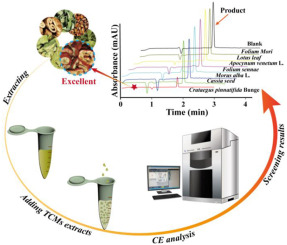Abstract
With a dramatic increase in the incidence of obesity, it is significant to screen lipase inhibitors from traditional herbal medicines as drugs to treat obesity. Lipase inhibitors currently used to treat obesity possess the defects of toxicity and off-target effects. Thus, there is an urgent need to explore more safe, effective and targeted anti-obesity drugs from traditional herbal medicines. In this work, amino functionalized magnetic cellulose microsphere was employed as a novel support to immobilize lipase through covalent bonding. Characterizations from fourier transform infrared spectroscopy, transmission electron microscopy and X-ray diffraction demonstrated the successful preparation of the support. In comparison with the free lipase, the immobilized lipase manifested the excellent properties of a wider range for pH and temperature endurance, better pH, thermal, storage stability and reusability. Through investigating the kinetics performances of the immobilized lipase, the Michaelis-Menten constant was calculated to be 2.05 mM and its inhibition constant for orlistat was ascertained to be 40.74 mu M. Eventually, the established strategy was applied to screen lipase inhibitors from 7 traditional herbal medicines and Crataegus pinnatifida Bunge was screened out due to its significant lipase inhibitory activity. To sum up, our newly established method not only developed a platform for efficiently discovering novel anti-obesity drugs from traditional herbal medicines, but also laid a solid foundation for successfully exploring undiscovered medicinal value of the traditional herbal medicines.

KeyWords Plus:ENZYME-INHIBITORS; CAPILLARY-ELECTROPHORESIS; PANCREATIC LIPASE; CHINESE MEDICINE; NANOPARTICLES; MICROREACTOR; MECHANISMS; EXTRACT; OBESITY
Published in TALANTA,Volume 231;10.1016/j.talanta.2021.122374,AUG 15 2021


